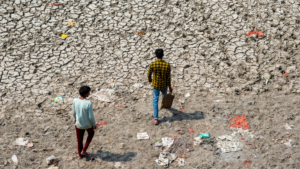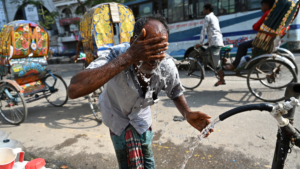SEVERAL states across the country were gripped by a deadly heat wave in May, 2023, a month leading to severe illness and dire consequences. Data suggests that the increasing heat waves in India, although lower than most parts of the world, has still been constant. The consequences of rising mercury despite being slower can be disastrous for the country, because a major part of India’s hinterland and northwestern areas already have blistering summers. Furthermore, even a minor increase can lead to severe consequences. In a country which heavily depends on agriculture, the slightest change in weather can spell catastrophe for crop yields, threatening the livelihood of millions.
These prolonged periods of extreme heat have far-reaching consequences, affecting both human lives and the environment. As temperatures continue to rise, it becomes crucial to understand the connection between these heat waves and the larger phenomenon of climate change and global warming. As individuals, we can contribute by making environmentally conscious choices, advocating for change and supporting organisations working towards sustainability. There are countless non government organisations (NGO) that are working relentlessly to save our planet and a greener world for future generations. By coming together and embracing sustainable practices, we can create a healthier, safer and more resilient future for India and the world.
Rising mercury: a stark reality
Over the past few decades, India has experienced a substantial increase in average temperatures. Heat waves, characterised by abnormally high temperatures and prolonged duration, have become more frequent and severe across the country. Analysing temperature records and climate models provide evidence of a clear upward trend.
Unveiling the role of climate change
Scientists assert that climate change plays a significant role in exacerbating heat waves. The increase in greenhouse gas emissions, primarily carbon dioxide, traps heat in the atmosphere, leading to a phenomenon known as global warming. This rise in temperatures serves as a catalyst for extreme weather events, including heat waves.
Amplifying factors in India
India’s unique geographical and climatic conditions make it particularly vulnerable to heat waves. Factors such as rapid urbanisation, deforestation and pollution contribute to the intensification of heat. Urban heat island effect, whereby urban areas trap and retain more heat than rural regions, exacerbates the impact of heat waves in densely populated cities.

Impacts on health and well-being
Heat waves pose severe risks to human health, with the most vulnerable populations being the elderly, children and those with pre-existing medical conditions. Heat-related illnesses, heat strokes, dehydration and respiratory problems escalate during prolonged heat waves. This not only strains healthcare systems but also disrupts daily life and economic activities.
Environmental consequences
Heat waves in India also wreak havoc on ecosystems and natural resources. Increased temperatures lead to droughts, water scarcity and agricultural losses. The stress placed on flora and fauna can disrupt ecological balances and further threaten biodiversity.
Mitigation and adaptation
Addressing the challenges posed by heat waves requires a two-pronged approach: mitigation and adaptation. Mitigation focuses on reducing greenhouse gas emissions through sustainable practices, promoting renewable energy sources and adopting cleaner technologies. Adaptation strategies involve designing heat-resilient infrastructure, implementing early warning systems and promoting community awareness and preparedness.

Government initiatives
Recognising the gravity of the situation, the Indian government has taken significant steps to combat climate change and mitigate the impacts of heat waves. Initiatives include the National Action Plan on Climate Change, the promotion of renewable energy, afforestation drives, and the implementation of heatwave management plans.
Individual and community action
Collective efforts are crucial in tackling heat waves. Individuals can contribute by conserving energy, using public transport, reducing their carbon footprint and advocating for sustainable practices. Communities can establish heat shelters, conduct awareness campaigns and develop heat-resilient infrastructure to protect vulnerable populations.
International cooperation
Addressing the challenges of climate change and heat waves requires global cooperation. India, as part of the international community, collaborates on agreements such as the Paris Agreement, which aims to limit global warming and mitigate its impacts.
The increasing frequency and intensity of heat waves in India serve as a stark reminder of the urgent need to address climate change and global warming. As temperatures continue to rise, the impacts on human health, ecosystems, and the economy become more pronounced. It is evident that heat waves are not isolated events but rather a manifestation of the broader climate crisis.
To combat this escalating issue, concerted efforts are required at individual, community, national and international levels. Mitigation strategies such as reducing greenhouse gas emissions and promoting sustainable practices must be prioritised to curb global warming. Simultaneously, adaptation measures, including heat-resilient infrastructure and community preparedness, are essential to minimise the adverse effects of heat waves.
The Indian government’s initiatives and international collaborations demonstrate a growing awareness of the severity of the situation and the need for collective action. However, combating climate change requires sustained commitment and continuous innovation.
The increasing heat waves in India are a call to action, urging us to address the root causes of climate change and work towards a more sustainable and resilient future. Let us recognize the urgency of the situation and join hands in protecting our planet for future generations.
–
Give’s mission is to “make giving bigger and better.” Give is the most trusted donation platform in India for fundraisers and crowdfunding campaigns. Through our technology solutions, we enable individuals and organisations to fundraise and donate to a cause, charity or NGO with trust and convenience. Give’s community of 2.7M+ individual donors and 300+ organisations supports 3,000+ verified nonprofits with 80G deduction and serves 15M+ people across India. Find a fundraiser today!

Choosing to tread the proverbial road less travelled, Ramon embarked upon a career in journalism and spent over 8 years working for various media organisations. A deeper calling to create a sustainable impact in the lives of the less fortunate compelled him to join the social sector. Ramon is a minimalist at heart and an explorer in spirit.
Discover more from
Subscribe to get the latest posts sent to your email.

